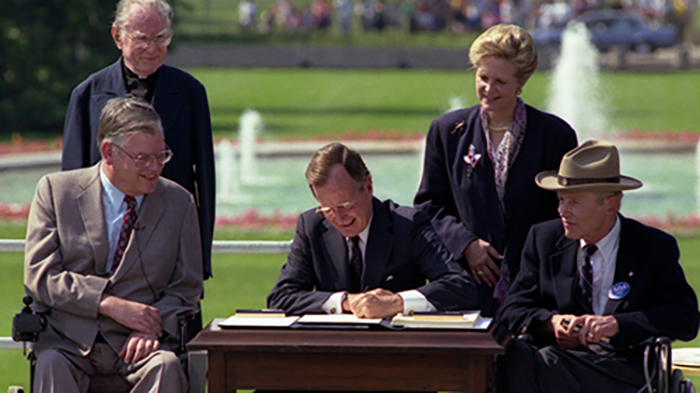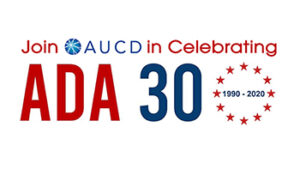
AUCD Celebrates ADA 30th But Barriers and Challenges Remain
SILVER SPRING, MD, January 17th, 2020 – As we begin 2020, we as a nation, including the Association of University Centers on Disabilities (AUCD), will be celebrating the 30th anniversary of the signing of the Americans with Disabilities Act (ADA). This landmark civil rights legislation impacts the lives of millions of Americans with disabilities and protects against discrimination and ensures and improves access to opportunities afforded to all.
“The ADA cemented in federal law the civil rights of Americans living with disabilities. These expectations have served as a new foundation of inclusion for more than a generation. We hope you’ll join us in sharing your stories and celebrating three decades of its success during 2020,” said John Tschida, Acting Executive Director of AUCD.
 The ADA was signed into law on July 26, 1990. Throughout the year and on the ADA Anniversary, AUCD will celebrate this landmark event as a way of bringing attention to the important work that has been done to promote equal opportunity for people with disabilities and to highlight the work that is yet to be done. We honor our leaders in the disability community who worked tirelessly for the passage of the ADA and look to our emerging leaders, many of whom have grown up after the ADA became law, to carry on the mission, hope, and vision of the ADA.
The ADA was signed into law on July 26, 1990. Throughout the year and on the ADA Anniversary, AUCD will celebrate this landmark event as a way of bringing attention to the important work that has been done to promote equal opportunity for people with disabilities and to highlight the work that is yet to be done. We honor our leaders in the disability community who worked tirelessly for the passage of the ADA and look to our emerging leaders, many of whom have grown up after the ADA became law, to carry on the mission, hope, and vision of the ADA.
Since the ADA, individuals with disabilities are protected from discrimination in all areas of public life including jobs, schools, transportation, and all public and private places that are open to the general public. Significant advances have been made to ensure people with disabilities live and work in the community with appropriate supports and services. The AUCD network of interdisciplinary centers in every state and territory have been instrumental in these efforts. They have revolutionized change in their states and transformed systems because of the ADA. AUCD is a network of leaders with rich stories to share about the real impact of the ADA across the nation.
We applaud these trends while also recognizing that many people with disabilities continue to face barriers. Many challenges remain, including:
- In the United States (U.S.), more money is spent per person on institutional and segregated services than is spent on community living and supported employment. In fact, $140,831 is spent on institutional services per person (2016 state operated ICF expenditure) compared with $43,928 on community services per person (2016 HCBS expenditure). There continues to be an institutional bias in our Medicaid program toward institutions over community-based services.
- Nearly every state has significant waiting lists for Medicaid Home and Community Based Services and Supports, the foremost funding source for community living. Recent data (2017) indicates an estimated 472,997 people with I/DD in the U.S. are on waiting lists for community services.
- In most states and communities, it is not unusual for people with disabilities to spend their days in sheltered workshops or non-work day services with little opportunity to move out of those environments into supported or competitive employment. Assumptions about the abilities of people with disabilities place low expectations on them, which both underestimate and undermine their potential achievement of supported or paid community employment.
- People with disabilities do not have equal access to various forms of technology (e.g., communication devices, mobility devices, smart home, digital information) that could greatly increase their ability to live and work in the community.
AUCD believes that everyone with a disability deserves to be in the community where they can live the life they choose with dignity. As a nation, we must enforce the core civil rights protections of ADA. Congress must support legislation that allows individuals eligible for long-term services and supports under Medicaid the right to individualized services and supports, such as:
- The Disability Integration Act (DIA) (S.117 and HR. 555): Will prohibit discrimination against individuals with disabilities who need long-term services and supports.
- The Transformation to Competitive Employment Act (S.260 and H. 863): Will transform business and program models to support individuals with disabilities to transition to competitive integrated employment, phasing out the use of 14 (c) certificates.
- Access to Free Speech for All Act (AFSFA) (S.1836): Will ensure individuals get the communication devices and services they need.
AUCD joins with other members of the civil rights community in celebrating the progress our society has made in the 30 years since the ADA and is committed to continuing the ongoing work needed to fulfill its promise of full inclusion for all members of all communities.
Related Research and Resources:
- Tuesday’s with Liz: What Does the ADA Mean to You?
- Community Living and Participation for People with Intellectual and Developmental Disabilities (PDF)
As previously noted, the membership of AUCD includes a national network – serving every state and territory – of 67 University Centers for Excellence in Developmental Disabilities (UCEDD), 52 Leadership Education in Neurodevelopmental and Related Disabilities (LEND) programs, and 14 Intellectual and Developmental Disabilities Research Centers (IDDRC). Together, these programs provide a direct national impact through direct services, the development of new professionals, and the use of new knowledge generated from our research.
AUCD is available for contact and resources. Contact Rylin Rogers, Director of Public Policy at rrodgers@aucd.org or 240-821-9381.
The University of Maine Center for Community Inclusion and Disability Studies is Maine’s University Center for Excellence in Developmental Disabilities (UCEDD) and a member of the Association of University Centers on Disabilities.
Photo courtesy of the Presidential Libraries of the National Archives.
